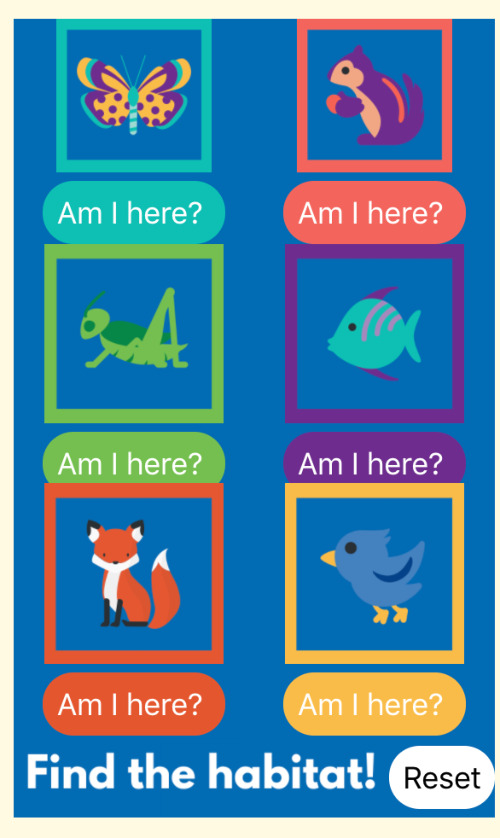Summer looks different this year. A number of families will follow health guidelines and choose not to go on vacation or even to a public pool. Students who typically spend all year looking forward to summer vacation may now find themselves enduring another stretch of isolation—and perhaps boredom. Parents are trying to balance keeping their kids safe with helping them continue to learn. While science experiences in the summer typically take the form of camps, activities in libraries and museums, and chance encounters at farmer’s markets, they will be much less available in 2020.
Those of us working in NCSE’s Breaking Down Barriers program are aware that the methods of science outreach have to change, at least temporarily. However, we also realize that it is more critical than ever for families to have access to free, evidence-based science activities from trusted sources. We’ve therefore worked with our Graduate Student Outreach Fellows to design our 2020 summer activity, Evolve Your Park, a suite of mobile apps launching in July that help users to explore specific local parks across the country. In this way, families can get together to explore science outside while maintaining a safe social distance from others, allowing them to capture some of the exploratory science outreach even in these difficult times. Because no two parks look the same, every app that we develop through this initiative looks different.
 Joe Jalinsky, for instance, has developed an app that helps amateur botanists in Hickory Hill Park, his neighborhood park in Iowa City, identify their local plant life through an interactive dichotomous key. This tool, used by botanists and amateur naturalists alike, asks a series of questions (e.g., “Is the leaf rounded?”) to narrow down the species being observed. After successfully identifying the species, families get facts about the evolutionary history of the plant. Jalinsky is currently working on a research project about teaching phylogenetic trees and was curious to see whether introducing a dichotomous key framework, which also uses a decision-tree branching point model, might scaffold later phylogenetic learning.
Joe Jalinsky, for instance, has developed an app that helps amateur botanists in Hickory Hill Park, his neighborhood park in Iowa City, identify their local plant life through an interactive dichotomous key. This tool, used by botanists and amateur naturalists alike, asks a series of questions (e.g., “Is the leaf rounded?”) to narrow down the species being observed. After successfully identifying the species, families get facts about the evolutionary history of the plant. Jalinsky is currently working on a research project about teaching phylogenetic trees and was curious to see whether introducing a dichotomous key framework, which also uses a decision-tree branching point model, might scaffold later phylogenetic learning.
Other fellows are using linear parks along rivers to help teach evolution, specifically highlighting local flora and fauna that appear in the evolutionary record at a particular time. Participants start at the beginning of time, then walk forward in time, recognizing key evolutionary events along the way. This allows people to understand evolutionary time with their feet, similar to NCSE’s Geology Park activity. Some fellows, including Catherine Henry and Zach Compton, are using GPS technology to help create scavenger hunts in which families try to identify components of an ecosystem, such as predator-prey relationships or habitats. These apps then detail how particular members of the park’s ecosystem are being affected by climate change. Each of these apps takes advantage of the pre-existing topology and local history to create interactive science outreach, crucial to an effective place-based learning experience.
Place-based learning is predicated on forming personal and local connections to what is being studied, and Evolve Your Park is no different. The apps require families to explore a location that may already carry significant meaning, challenging them to connect with a place in a new way. This methodology is particularly powerful when trying to teach evolution and climate change. Both topics may be introduced as taking place globally, over long periods of time—a perspective that can be difficult for humans to fully grasp. Evolve Your Park works to help people understand a smaller, local picture by engaging them in family-fun, outdoor games created by local scientists. These games then help expand understanding by connecting the local park to a broader picture in evolution or climate change. These activities help people understand in a tangible way topics that might otherwise seem distant or illusory.
NCSE will continue to be responsive to the current state of science education across all our programs, while striving to help students, parents, and teachers create meaningful educational experiences in evolution and climate change. NCSE recognizes that science can—and should—be fun; we hope that playing Evolve Your Park will allow you and your loved ones to recapture some of that classic summer science fun.
We will be uploading information to our website about which locations have Evolve Your Park activities when the apps launch in July 2020. If you would like to design an activity for your local park, contact Emma Doctors at doctors@ncse.ngo.


